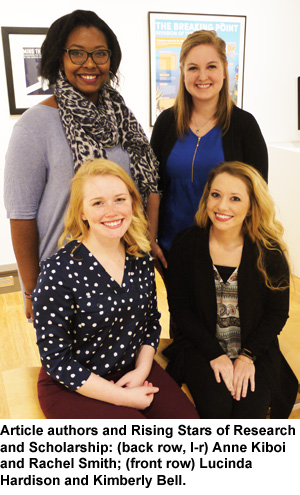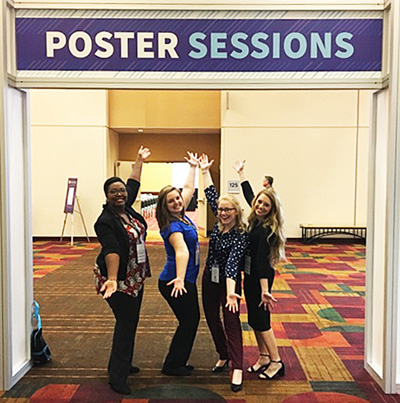As students, the authors helped educate nurses at a small rural hospital on evidence-based practice. The program’s benefits—for nurses, patients, and Rising Stars—are ongoing.
 Our Rising Star journey began when the chief nursing officer of a small rural hospital, speaking at a regional nursing research consortium, expressed the need for staff members to acquire more evidence-based practice (EBP) knowledge and additional skills. In response, Susan Seibert, DNP, RN, CNE, a nursing instructor at the University of Southern Indiana (USI) College of Nursing and Health Professions, proposed a partnership: BSN honors students at USI would promote EBP at the hospital and help meet the hospital’s nurse development needs while serving as ambassadors of the nursing college. We were those students.
Our Rising Star journey began when the chief nursing officer of a small rural hospital, speaking at a regional nursing research consortium, expressed the need for staff members to acquire more evidence-based practice (EBP) knowledge and additional skills. In response, Susan Seibert, DNP, RN, CNE, a nursing instructor at the University of Southern Indiana (USI) College of Nursing and Health Professions, proposed a partnership: BSN honors students at USI would promote EBP at the hospital and help meet the hospital’s nurse development needs while serving as ambassadors of the nursing college. We were those students.
Using interactive learning tools, we sought to increase the hospital nurses’ confidence in using EBP and incorporate it in practice, thereby benefiting the hospital and its patients. As an educational benefit to the college—and to us—the partnership was also designed to increase our understanding of evidence-based practice and improve our professional presentation skills.
The project was a success, and we shared our experience with the world in October 2017 at the 44th Biennial Convention in Indianapolis, Indiana, USA. As Rising Stars of Research and Scholarship, we presented a poster session titled “A collaborative approach to educating evidence-based practice among BSN students and rural hospital nurses.” Besides being a great honor and advancing our own professional development, our convention experience provided the opportunity to join nursing professionals from around the world—from places such as Kenya, Nigeria, and Thailand—in sharing what we had learned and accomplished. What a venue to gain a global nursing perspective!
 We met extraordinary people from around the world who are working to advance nursing practice and improve safety of populations through nursing research and evidence-based practice. We were amazed at the number of exhibits, and we learned how changes made in small communities have worldwide impact. Sharing stories with nursing professionals and hearing about projects around the globe inspired us to continue promoting research and EBP in our work environments as we began our nursing careers.
We met extraordinary people from around the world who are working to advance nursing practice and improve safety of populations through nursing research and evidence-based practice. We were amazed at the number of exhibits, and we learned how changes made in small communities have worldwide impact. Sharing stories with nursing professionals and hearing about projects around the globe inspired us to continue promoting research and EBP in our work environments as we began our nursing careers.
To make it all happen, faculty mentors at USI—Seibert, Jennifer Evans, DNP, RN, and Sue Krieg, MSN, RN, FNP-C—at times pushed us beyond what we believed we were capable of. In the process, we made a difference in patient outcomes at a critical-access hospital.
Working closely with nursing faculty, we engaged in an educational experience that could not be achieved in the classroom. In the process, we learned the art of teamwork and collaboration and also improved our communication skills. We learned how to write and submit abstracts through a peer-reviewed process, create presentations, speak at professional conferences, develop budgets, and apply for grants. And as part of the evaluation aspect of our project, we completed Protection of Human Subjects training.
Looking back, we recognize that the project was a powerful self-discovery opportunity. By presenting what we had done and learned at local, regional, and international venues, the project helped us develop our skills and potential. In fact, ours was the only student group accepted for a peer-reviewed podium presentation at a regional health professions educator conference. After our presentation (Kiboi et al., 2017) at that conference, many attendees praised our work and applauded our recognition as Rising Stars. That was when we came to recognize that what we were doing was important and extraordinary.
We were also invited to present our work (Bell et al., 2018) at the regional nursing research consortium. One year earlier at that consortium, the chief nursing officer had expressed the need for nurses at her hospital to gain experience with evidence-based practice. This research consortium is composed of nurse administrators, researchers, and academic partners from medical centers where we had done our clinical rotations and had been involved in regional nursing programs. We were gratified that these nursing leaders, as well as the dean of our USI College of Nursing, had embraced our project as an example of the consortium’s impact on nursing practice.
The EBP project and the resulting Rising Star recognition (Hardison, Goldstein, Kiboi, & Bell, 2017) also enhanced our résumés and job applications. We provided a list of publications and presentations that had come about as a result of the project to potential employers, and it became a central discussion point during our job interviews. They were very interested in the Protection of Human Subjects training we had received and observed that most new graduates do not have that certification. They asked for more information about the project’s outcomes and asked how the nurses who received the EBP education had responded. The experience truly helped set us apart from other new graduates applying for employment and gave us an opportunity to convey our knowledge of nursing research and EBP processes.
Our success as nursing students and the leadership development we gained through our project and Rising Star recognition enabled all of us to get our dream jobs. Anne is now a staff nurse on a surgical ICU unit. Lucy is working on a hospital burn unit. Rachel is employed on a renal diabetes unit. And Kim is a staff nurse on a pediatric ICU. During our leadership development journey, we became committed—even as new RNs—to promoting nursing research and EBP in our nursing careers.
When we were inducted as members of Sigma Theta Tau International Honor Society of Nursing (Sigma), we pledged to uphold nursing excellence, knowledge, service, and leadership. As Rising Stars, we had the opportunity to get a head start on that commitment. RNL
Kimberly A. Bell, BSN, RN, Lucinda N. Hardison, BSN, RN, Anne W. Kiboi, BSN, RN, and Rachel R. Smith, BSN, RN, graduated in 2018 from the University of Southern Indiana College of Nursing and Health Professions in Evansville, Indiana, USA. Today, all are employed at Indiana hospitals in Evansville and Indianapolis.
References:
Bell, K., Hardison, L., Kiboi, A., Goldstein, R., Heckman, A., Mehringer, S., …Voyles, G. (2018, April). A collaborative approach to educating evidence based practice among BSN students and rural hospital nurses. Paper presented at University of Southern Indiana Endeavor Symposium, Evansville, IN.
Hardison, L., Goldstein, R., Kiboi, A., & Bell, K. (2017, November). Our experience as Rising Stars. Paper presented at Omicron Psi Chapter Fall Program, Sigma Theta Tau International Honor Society of Nursing, Evansville, IN.
Kiboi, A., Bell, K., Goldstein, R., Hardison, L., Heckman, A., Parsons, A., … Spiller, J. (2017, October). A collaborative approach to educating evidence based practice among BSN students and rural hospital nurses. Paper presented at University of Southern Indiana Nursing and Health Professions Educator Conference, Evansville, IN.